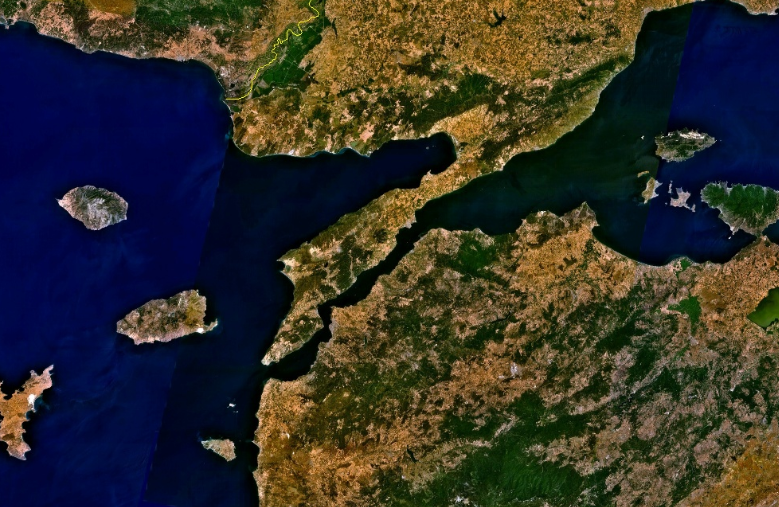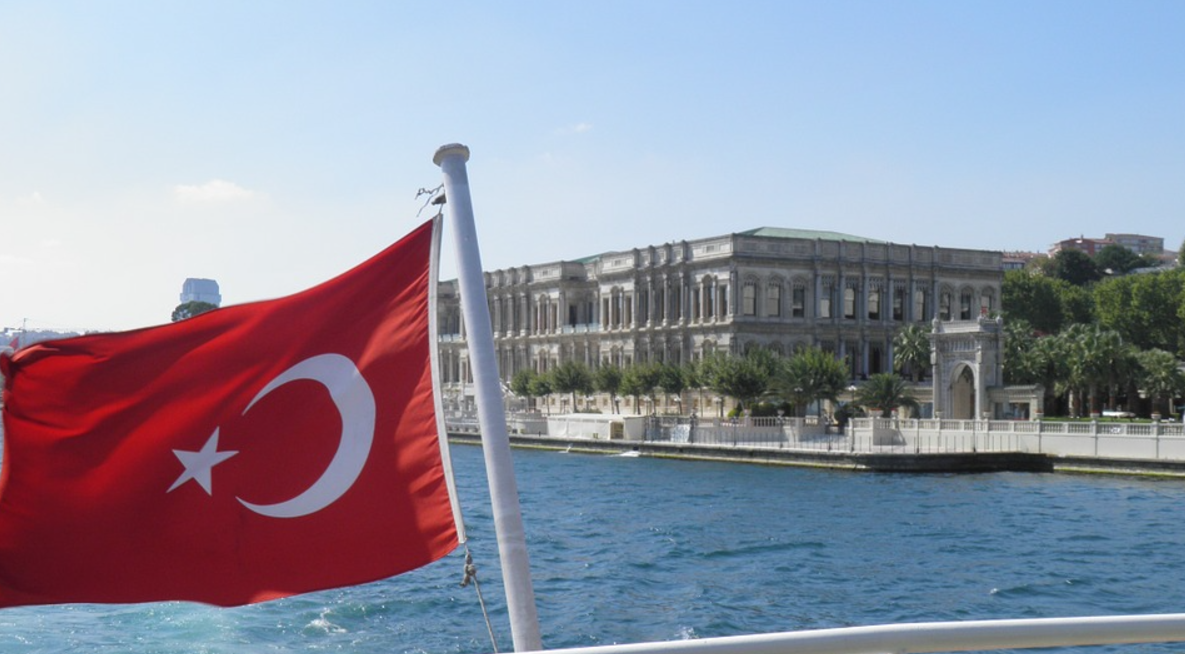Russian Strategy towards the Turkish Straits. Part 2

(Photo: Pixabay)
At the times of Lenin when the Soviets were weak, Lenin defined the Soviet strategic properly, but when the Soviet Union became a superpower, the Montreux Convention began to play against its imperial interests limiting the Soviet Union. In XXI century, the situation was quite similar, but the escalation of the international situation after the annexation of Crimea and the weakness of Russia being actually alone against NATO, allows anticipating that for her in current circumstances it was much better to keep up the conditions of the Montreux Convention. Of course, it is much easier when Putin managed to establish not merely a naval base but the same that Britain has in Cyprus or Gibraltar, only in Syria with the pretence that Syria is formally an independent state. In general, Stalin was right in his thinking from the Soviet expansionist perspectives – such a land mass sooner or later will need much better and broader conditions regarding the Turkish Straits.
The most striking example of limitation is the ban of aircraft carriers from passage through the straits. To get around this provision, the Soviets called the new ski jump deck carrier Kiev and helicopter carrier Moscow and Leningrad “antisubmarine cruisers” in July 1976 in order to formally pass the straits. Turkish government despite Western opposition allowed them to pass from Black Sea where they were assembled, to the Mediterranean Sea. The Russian Federation’s sole aircraft carrier Admiral Kuznetsov theoretically could pass through the straits, because according to the Soviet tradition, it is an antisubmarine cruiser. Additionally, already at the end of 1960s, it became clear that the Soviet Union has problems with the simple bureaucratic problem namely with the notifications about passage. According to the binding rules before the mission of a warship beyond the Black Sea, the Turkish Government has to receive the notification thus compromising any secret missions the Soviets might have, particularly because Turkey is a member of NATO. The Soviets found a way to complicate US Sixth Fleet planning by filling multiple advance notifications which create some confusion about the actual date of transit. Moreover, it should be taken into account that the maritime transit of the Soviet naval and commercial vessels was so numerous that Ankara, as a concession and convenience, has dropped virtually all pretence at restricting either numbers or types of Soviet ships. For example, in 1978 through the straits passed more than 7,000 Soviet vessels. The Montreux Convention had and still has even more time limitations due to the bureaucratic specificities. For instance, the necessity of regular notifications about usual time for reaching from the Black Sea naval base to free egress to the Mediterranean Sea is up to 8 days, while without notifications (free passage), the period is only 4 days. In 1973, 50% of the total Soviet commercial tonnage and 40% of all commercial ships were in the Black Sea and the Turkish Straits had tremendous economic meaning for the Soviet economy.
Moreover, Turkish NATO membership and her sovereignty over the Turkish Straits were under huge concern in Moscow in terms of war contingency. Under pressure of allies, Turkey would probably close the straits while the significant part of the Soviet Black Sea Fleet were left operating in the Eastern Mediterranean. This might have created a situation where the Black Sea remained defenceless.
The ability of the Soviet Union and Russia to have access to the Mediterranean Sea makes her a serious regional player. The projection of power was the crucial mission of the Fifth Squadron. There is always a chance to prevent even a hypothetical intervention of NATO to the internal development as has happened in Libya or Syria. In that context the U.S. military bases on the territory of Turkey are having a sobering effect. For Turkey, in case of war, it was by paradox an existential threat, since her territory more likely could become a battleground between two superpowers. Even nowadays such a threat exists, but as long as the political regime in Ankara behaves predictably, Russia will be happy. However, what will occur if the situation changes?
Notwithstanding all the aforementioned complexities that faced the Soviet Union, it projected power persistently into the Middle East, providing direct evidence of the importance for Moscow in this part of the world. Apart from these difficulties, the permanent projection of power in the Eastern Mediterranean has the following benefits:
- Worldwide prestige, being one of the greatest naval powers that is able to project her power in one of the most unstable regions of the world;
- Secure communications and arteries that provide economic and business activities with crucial Middle Eastern countries;
- Secure the merchant and fishing fleets that operate in the Mediterranean Sea and passing the sea for reaching overseas territories like Africa, India, the Persian Gulf and Latin America. Interestingly, the Soviet Union tremendously suffered when the Suez Canal was closed after the Middle Eastern crisis owing to the fact that it was much more difficult to maintain power projection in the Indian Ocean and the Persian Gulf;
- Providing military and economic support to the allies if necessary;
- Power presence factor – it is a factor of power that pushes regional powers or a target power to admit the strength and presence the challenging power. In our case it is about forcing regional actors to accept her as a new, permanent and strong factor in the regional balance. That was the case during the Cold War and now is present in the Middle East after 2015.
After the collapse of the Soviet Union, the Russian Federation is in solitude on the issue of the future of the Turkish Straits. If before she had more or less allied Romania, Bulgaria, Yugoslavia, now all the Black Sea powers more or less are belligerent towards Russia and her ambitions, particularly after the annexation of Crimea.
Dardanele (photo: Wikipedia)
RUSSIAN AND TURKISH STRAITS BEFORE 2011
Relations with Turkey regarding the Turkish Straits were not so peaceful and amicable. Turkey wanted a revision of the status of the Turkish Straits right after 1991 and to receive the status of internal waters, while Russia was opposed to this idea. Thus, in the spring of 1992, Turkey attempted to unilaterally extend the rules of the port of Istanbul to the entire zone of the straits, thereby obtaining the right to close the Bosphorus even in peacetime.
However, Greece and the Soviet Union reacted promptly and the matter was left to the history books. In 1994, the Turkish government introduced new regulations on passage, which became much stricter. For example, as a result of the introduction of regulations from July 1, 1994 to December 31, 1995, there were 268 cases of unjustified delays which resulted in a loss of 1,553 hours of operating time and damage in the amount of more than 885 thousand US dollars, not counting lost profits, lost contracts and late charges. In 2003, a Turkish boat tried to prevent the passage of the large landing ship “Caesar Kunikov” and demanded to stop at VHF. The 2nd rank captain of the ship Sergey Sinkin replied: “Do not interfere with my actions.” Machine gunners turned around on deck – the marines, the crew on alert took combat positions.
However, the situation took on quite a dangerous outlook in 1997. One of the most serious problems that arose in 1997 between the two countries was connected with the sale by Russia of the S-300 type air defense system to the Greek part of Cyprus. On January 5, 1997, the Government of Cyprus and “Rosvooruzhenie” signed a contract for the supply of S-300 to Cyprus. In 1997, in the Greek part of Cyprus, it was announced that a missile defense system would be deployed in the south of the island. The deployment of Russian S-300 missiles in Cyprus was another conflict point between Turkey and Russia. As soon as the Government of Cyprus declared its intention, it ran into resistance: the EU and the US rejected this military measure. But the sharpest was Turkey’s reaction. The Turkish Foreign Ministry stated that Turkey would not be able to turn a blind eye to the fact that the Turkish community of Cyprus will be in danger, the threat of its territory will arise, and the Turkish-Greek balance in the Eastern Mediterranean will be disturbed. In Ankara, the reply went: if the missiles are really placed, it will be a “pretext for war”. Moscow declared that it was an exclusively commercial operation. When the information appeared about the passage of ships through the Straits, on board of which S-300 systems could be on board, Turkey began to track the movement of all suspicious ships through the Straits. There is a case when Turkey detained and searched an Egyptian ship, on board of which parts of rocket launchers were carried. After confirmation by the Egyptian authorities that the equipment belonged to Egypt, the ship continued on its way. The Russian media criticised Turkey’s actions, since according to Article 21 of the Montreux Convention, when passing military ships through the Straits, Turkey had the right to ban passage only in case of an imminent military threat, while for merchant ships there were no restrictions regardless of their cargo. The Russian ambassador in Ankara stated that when passing through the Straits in the event of an attack on a ship, transporting S-300 missile launchers, Russia will consider such actions to be the cause of the war. However, over time, Russia began to adhere to a less principled position.
The collapse of the Soviet Union put the entire Russian army into constant crisis but the biggest crisis happened in the Russian Navy; Boris Yeltsin did not pay attention to the navy. The situation changed only when Putin acquired power, but almost until 2011 Russia did not pay sufficient attention to the Turkish Straits, because Russia did not have any reasons to go to the Mediterranean Sea. The main reasons for such non-offensive posture were:
- Russia was a minor power in the Black Sea that possessed a short coastline with the main naval base in Novorossiysk;
- The Russian Navy in Sevastopol was under scrutinised control of Ukraine that reacted to any Russian attempt to modernise the navy;
- Crimea was under full control of Ukraine;
- The factor of humiliation. The psychological effect, without Crimea, it is impossible to imagine that Russia would go to Syria;
- The international environment has changed in the Eastern Mediterranean spectacularly. Someone had to fill the vacuum of power;
After the annexation of Crimea in 2014, the situation for Russia has changed in every aspect in the Black Sea, in the Eastern Mediterranean and the perception of the Turkish Straits returned to the times of the Cold War. Nevertheless, the first signs that Russia has been changing happened in Georgia in 2008 and in Syria since 2011, when she took Assad’s side. For the purpose of providing support to Assad, Russia established in 2013 a permanent operational connection of the Navy of the Russian Federation in the Mediterranean. With the start of the military operation of the Russian Aerospace Forces in Syria on September 30, 2015, the unit takes part in this operation, carrying out the cover of the Air Force of the Russian Aeronautical Forces Aviation Group in Syria and the Hmeymim airbase on which it is deployed. The main task of the compound is to act in support of activities of the Russian troops in the Syrian Arab Republic. A major share of the delivery of all military and other supplies to Syria were and are still being made by Russian vessels through the Turkish Straits. Usually it was a maritime route (the “road of life”) between Novorossiysk and Tartus. Furthermore, only in May 2017 for resupplying through the Turkish Straits the Russian Operational Squadron in the Eastern Mediterranean there were sent 83 Russian naval vessels to Syrian waters.
However, already in December 2015, right after the incident with the Russian Sukhoi Su-24 shutdown, many experts and politicians worried that Turkey could close the Turkish Straits according to the Montreux Convention. If Turkey made such a move, Ankara would put under threat the entire Russian operation in Syria. Alternative logistical routes – from open routes through Gibraltar for example – takes from 13 days in the case of departure from St. Petersburg or 14 and a half days when departing from Murmansk instead of four days. By air is another option but this is expensive. Moreover, Admiral Kasatonov proposed that in such a scenario there is always a possibility to deliver supplies to Syria through the territory of Iran. It is known that at least three amphibious assault ships of the Black Sea Fleet are constantly working on “Syrian transit”: Project 1171 “Nikolay Filchenkov”, Project 775 “Caesar Kunikov” and “Azov”. The first one can take on board up to 1,500 tons of equipment and cargo and 300-400 troops. The ships of the project 775, in their turn, can accommodate in the hold and place on the upper deck 13 armored personnel carriers or 20 trucks weighing up to 500 tons. In case of urgent necessity for Syria, there can be engaged An-124 Ruslan – a super heavy military transport aircraft. In total, there are 26 of them in the VKS. The heavy truck lifts up to 12 tons of freight. Nevertheless, this incident was a sign to the Kremlin that for long-term goals it is dangerous to rely on the Black Sea region as the main transit corridor. In comparison, it is possible to see that the Black Sea corridor is still quite important for Russia. In 2016, oil exports from Novorossiysk (which includes large volumes of Kazakhstani oil) amounted to 30.4 million tons, while Primorsk amounted for 50.6 million tons, the Druzhba pipeline – 54.3 million tons, and from the Far Eastern port of Kozmino – 31.84 million.
For the Russian Federation, the issue with the Turkish Straits is not only about military aspects and Syria. It is also about merely the economy – for instance in 2014, according to Transneft, exports of Russian oil through the Black Sea terminals last year amounted to 24.6 million tons, oil products – 37.2 million tons. The total volume of crude oil and oil products transported through the straits in 2014 is estimated at 124.4 million tons Russian oil is delivered from the port of Novorossiysk, as well as oil from Kazakhstan, Azerbaijan and Turkmenistan.
Bosphorus (photo: Pixabay)
RUSSIA AND THE MONTREUX CONVENTION AFTER CRIMEA AND SYRIA
The Russian Federation usually avoids escalation over the strait issue, because she clearly recognizes that she is going to lose in case of revision. Since 2014, it is doubtful any country is ready to become an ally of Russia in that matter. Nevertheless, if she finds that some riparian state would be ready for the revision under conditions that could be adjusted to Russia’s post-Crimea national interests – she can go with the notion of revision of the Montreux Convention. Besides this, the western reaction particularly after the Warsaw NATO Summit in 2016 on Russian power augmentation in the Black Sea puts Moscow in quite an inconvenient position. As much as NATO’s naval activities are rising in the Black Sea, as that Russia is proclaiming adherence to the Montreux Convention and does not have any particular interests for revising it.
Increasing presence of NATO naval forces in the Ukrainian ports is a part of Russian concerns and the most acute scenario if NATO warships try to claim freedom of navigation in the Sea of Azov. According to the press secretary of Vladimir Putin, D. Peskov, the warships of the North Atlantic Alliance may enter the Sea of Azov, but only under certain circumstances.
An ideal scenario for Moscow in terms of revision of the Montreux Convention would be to find a way to Turkey and settle the issue with Ankara alone. Surely, they both would like to avoid the violation of the principle of open seas for the merchant fleets of any countries, but limiting the presence of warships for non-riparian states can happen.
Particularly, if we take into account that the Montreux Convention returned to Ankara the sovereignty over the straits at the time with undeniable support of Moscow. It was one of the key suggestions of Lenin to the Lausanne delegation. But Turkey is suspiciously silent about it and without her, Russia will not make its move. Russia’s primary goal is to reduce the terms of stay of the warships of the non-riparian states in the Black Sea. Yet Ukraine, Georgia and Romania would like to see the opposite if the modifications could be adopted.
The gist of the situation is that many things can change, especially after the most ambitious project in Turkish history, namely, the construction of an alternative “Istanbul” canal leading to the Bosporus strait. Russia is carefully watching this project; some experts in Russia suggest that the “Istanbul” canal will topple the Montreux Convention in the next decade, when the project is going to be finished. Turkey will definitely put in place new rules and regulations and the issue is who they will be more favourable to – Russia or NATO members. The separate agreement between Turkey and the Soviet Union on the Turkish Straits was a concern of the West during the Cold War and such a possibility survived, having many chances in XXI century, which are even more realistic than before.
According to the Montreux convention, Russia can initiate independently the revision of the convention. However, she would not do it and after officially submitting, all sides have to wait two years before assembling a conference. The United States did not participate in the Montreux conference, but she would definitely join and many others could join as well. Russia would invite China, India, the Central Asian states and Iran. Stalin’s concern for many years was the fact that Japan was a signatory of the convention and he wanted to get rid of this country from the Convention.
Ironically from the point of view of history, in the American note of November 2, 1945, the Americans almost accepted the Soviets’ demands that any warships of non-riparian states must be banned from entrance to the Black Sea, but total freedom of navigation to the merchant fleets of any country. Unfortunately for both sides, the Cold War started and the world turned into the opposing blocks. The British Empire and afterwards the United States staunchly tried to stop Russia on the doorstep of the Middle East in XIX century and XX century, but in the 1950s the Soviets made a breakthrough into the Middle East and the Eastern Mediterranean and leapfrogged the barrier which was cautiously created by the West. Similar things are happening nowadays and with more global repercussions than during the Cold War. It is almost impossible to “roll back” Russia from the region. Two options are available – either a domestic crisis that would wipe out Putin’s regime, or similar changes in Ankara. Time will show whether these are real scenarios. If the West does not stop them, the shape of Western Eurasia will be changing but not in favour of the West.
Autor
Ridvan Bari Urcosta
Senior Analyst at Strategy&Future








Trwa ładowanie...